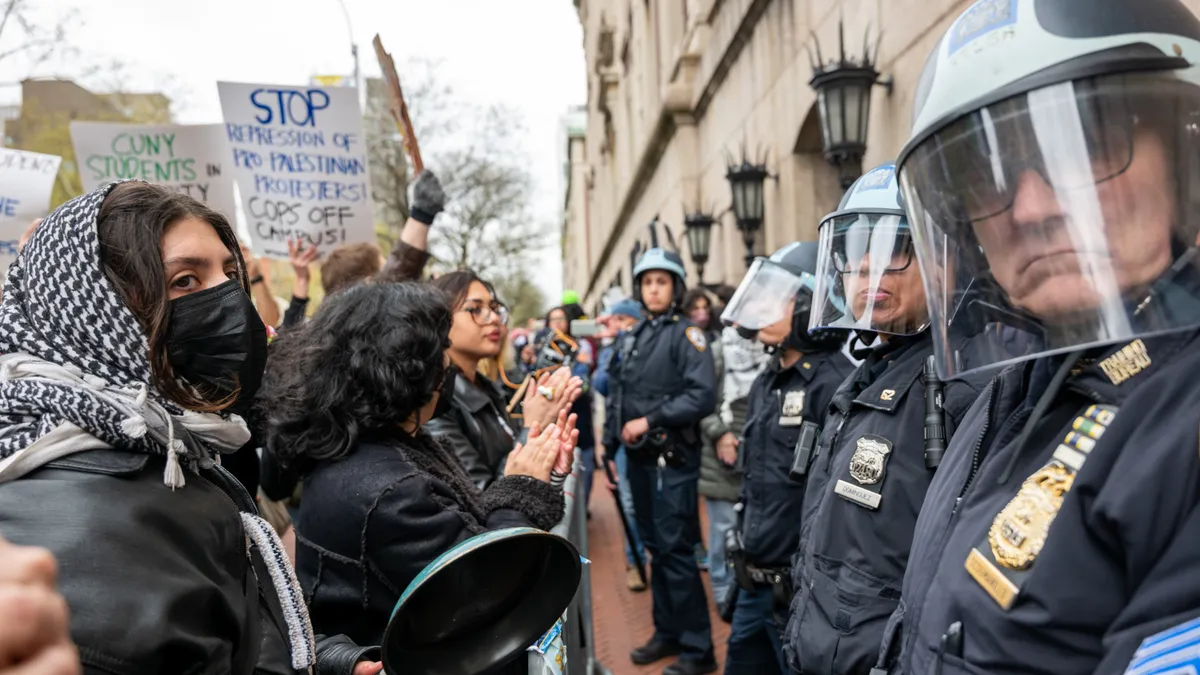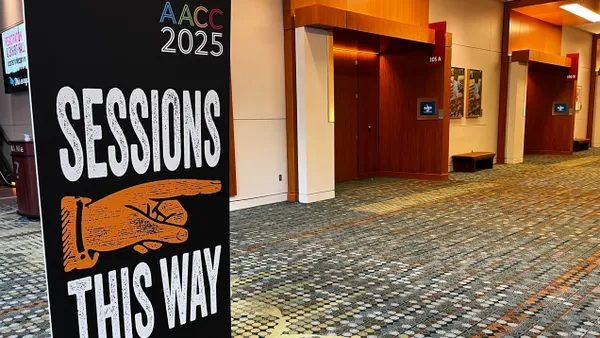Dive Brief:
- Columbia University temporarily shifted to fully remote classes Monday as its administration struggles to handle pro-Palestinian protests that have ramped up on campus over the past week.
- Columbia's security force is only permitting individuals with a university-issued photo ID to access the campus amid "considerable disruption and distress,” according to Cas Holloway, Columbia's chief operating officer. The increased security measures, which also include a limited number of campus entry points, will remain in effect until further notice.
- Columbia President Minouche Shafik encouraged employees who can work remotely to do so on Monday, and said the administration preferred students living off campus to stay away from campus. Her announcement comes as lawmakers from both sides of the aisle are calling for her to step down.
Dive Insight:
Pro-Palestinian protesters have been active on Columbia's campus for weeks, though tensions surged after they formed an encampment early Wednesday on the university’s South Lawn. The encampment formed the same day Shafik testified in front of Congress about how the university has been addressing antisemitism.
On Thursday, Columbia university officials requested police intervention to clear out the protesters’ encampment. During that effort, the New York Police Department arrested more than 100 protesters, including students from Columbia and its sister institution, Barnard College, on trespassing charges.
New York City Police Commissioner Edward Caban described the protesters as cooperative, The Associated Press reported.
Likewise, New York City Mayor Eric Adams said in a statement Sunday that the arrests were completed without injuries. He also condemned reports of antisemitic signs and speech during the protests.
"As I have repeatedly said, hate has no place in our city, and I have instructed the NYPD to investigate any violation of law that is reported. Rest assured, the NYPD will not hesitate to arrest anyone who is found to be breaking the law," Adams said.
Several students at Columbia and Barnard say they have been suspended over last week's demonstrations.
One of the students suspended Thursday was Isra Hirsi, a social justice activist and daughter of Rep. Ilhan Omar, a Democrat from Minnesota. Hirsi posted on social media that she had never before been reprimanded by her university.
Maryam Iqbal, another Barnard student who was suspended for participating in the Gaza Solidarity encampment, posted an email on social media indicating that the college gave her 15 minutes to collect her things from her dorm.
The demonstrations have taken place against the backdrop of Columbia’s admitted students weekend.
Shafik said Columbia students "across an array of communities" expressed fear for their safety on campus.
"The decibel of our disagreements has only increased in recent days," she said in a Monday letter. "We need a reset."
Adams similarly disavowed the protesters.
“As mayor of the city with the largest Jewish community in the world outside of Israel, the pain these protests are causing Jews across the globe is not lost on me, especially as we start Passover," Adams said.
Adams attributed the source of campus tensions to "professional agitators," while Shafik pointed to "individuals who are not affiliated with Columbia."
The New York Police Department has increased the number of officers around Columbia's campus, Adams said.
Columbia and Barnard faculty have criticized the administration for both suspending protesters and inviting the NYPD onto the university's private campus.
"These acts violate the letter and the spirit of the University Statutes, shared governance, students’ rights, and the University’s absolute obligation to defend students’ freedom of speech and to ensure their safety," the Columbia and Barnard chapters of the American Association of University Professors said Friday.
Following an emergency meeting, the chapters released a joint statement demanding all suspension and charges be expunged from students' records. Faculty also organized a walkout on Monday in protest of the administration's approval of police on campus.
"I know that there is much debate about whether or not we should use the police on campus, and I am happy to engage in those discussions," Shafik said Monday. "But I do know that better adherence to our rules and effective enforcement mechanisms would obviate the need for relying on anyone else to keep our community safe. We should be able to do this ourselves."
Last week, Shafik testified in front of the House education committee and faced repeated attacks from Republican lawmakers, especially Rep. Elise Stefanik. Stefanik continued her charge against Shafik this week and called for her resignation.
"Over the past few months and especially the last 24 hours, Columbia’s leadership has clearly lost control of its campus putting Jewish students’ safety at risk," Stefanik said in a Sunday statement. "The Columbia Board must appoint a President who will protect Jewish students and enforce school policies."
Lawmakers, including all House Republicans who represent New York, have since joined Stefanik in her calls for Shafik to be ousted.
Rep. Virginia Foxx, a North Carolina Republican and chair of the House education committee, sent a letter to Shafik and two Columbia trustees pushing them to crack down on the protests.
Foxx said that Shafik took the "important step" of bringing in police.
"However, the encampment promptly reconstituted that same afternoon and has been allowed to continue unabated ever since," Foxx wrote Sunday. "This situation is unacceptable, and it is imperative that Columbia’s leaders restore order and safety without further delay.”














